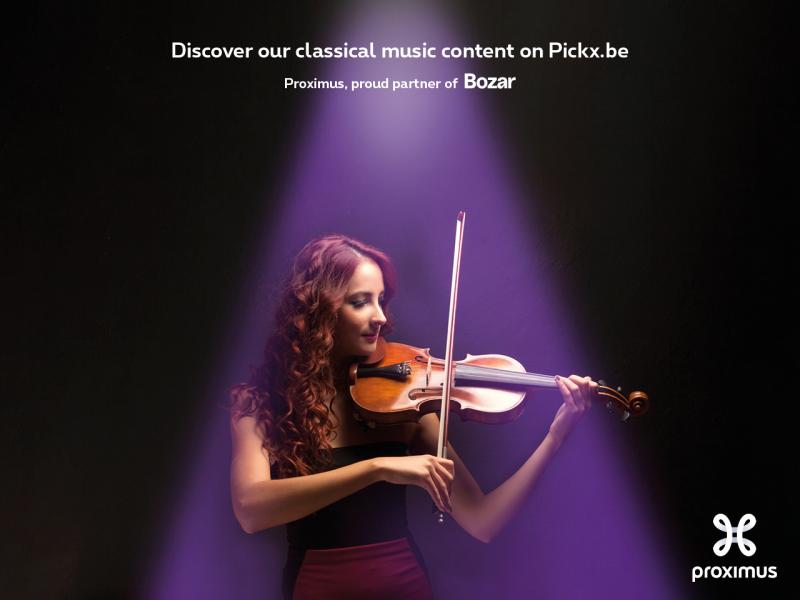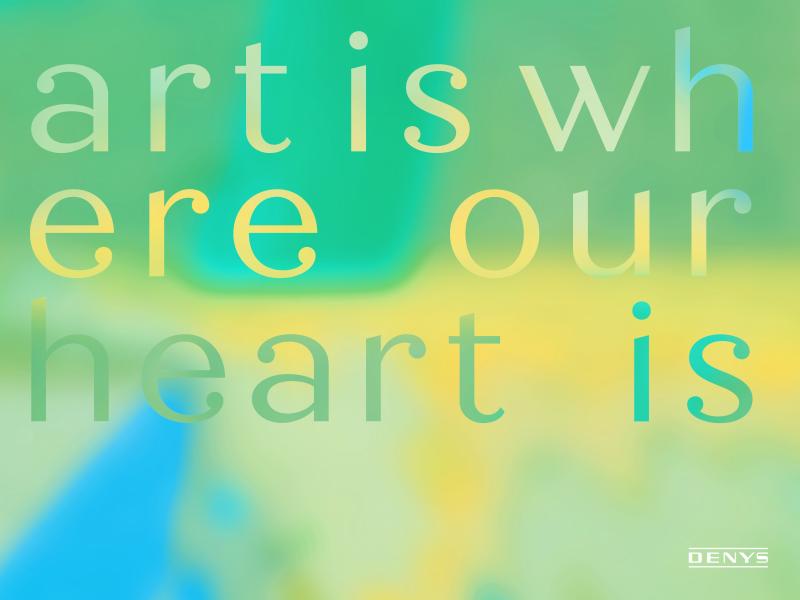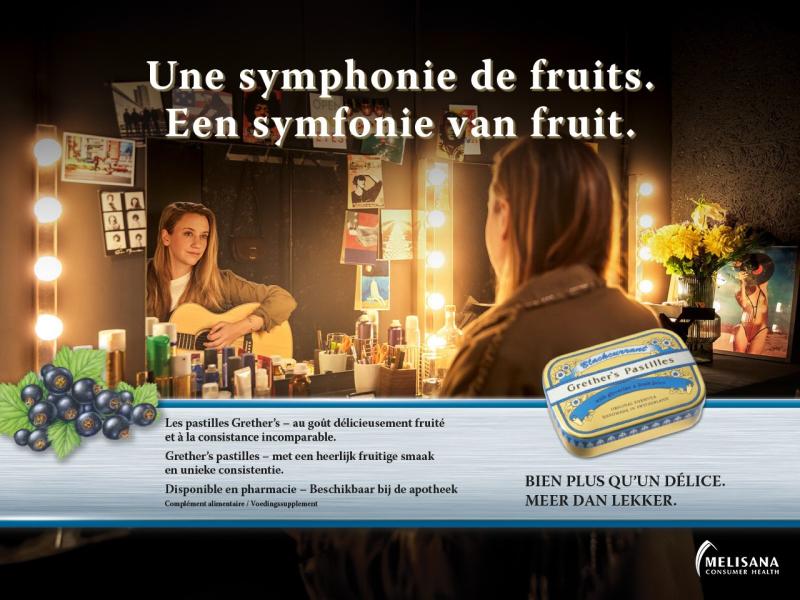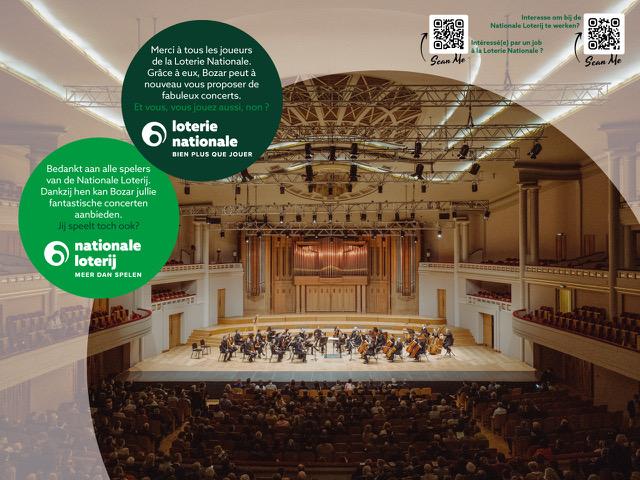Youth Symphony Orchestra of Ukraine
5 Sept.'23
- 20:00
Henry Le Boeuf Hall
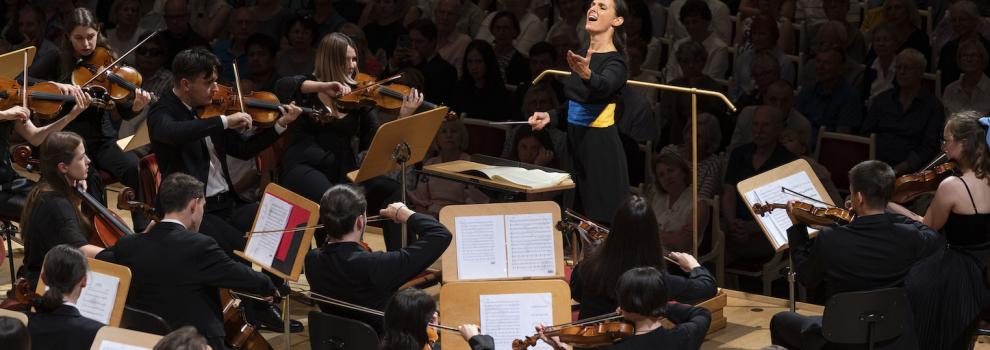
Each generation reshapes a country’s spirit. This is why I believe in Ukraine. Its youth, fiercely proud of their Ukrainian identity, freedom, and democracy, look forward with confidence. Many have had their childhoods stolen by Russia's brutal war of aggression. They have earned a brighter future in Europe—a future anchored in a just peace. With music, we not only begin the healing process but also unite in our journey. In the words of Volodymyr Vakulenko, it is a path "towards a different light”: the light of day at the tunnel's end. The European Union stands firm with Ukraine’s children, artists, and every Ukrainian forging a hopeful tomorrow for Ukraine and our European family. - Ursula von der Leyen, President of the European Commission
Ukranian Youth Orchestra
Oksana Lyniv, conductor
Yuliia Tkachenko, soprano
Valentina Pluzhnikova, mezzo-soprano
Andrii Bondarenko, baritone
Dmytro Uvdoychenko, violin
Vognyk, girls choir
Dzvinochok, boys choir
Olena Solovey, choir master
Philip Kelz, narrator
Evgeni Orkin
Tatuseva knyga (Daddy's book)
Cantata based on Volodymyr Vakulenko's diary and poems and witness accounts of the events that took place in 2022
Break
Max Bruch (1838-1920)
Concerto for violin and orchestra nr. 1 in g, op. 26 (1866)
- Allegro moderato
- Adagio
- Allegro energico
As a tribute to Ukrainian war victims, the Youth Symphony Orchestra of Ukraine presents the world premiere of the oratorio Daddy's Book by Evgeni Orkin. The work is based on texts by Volodymyr Vakulenko, an activist, writer of children's books and poet, who was tortured and killed near Kharkiv in December 2022. After the world premiere, the young Ukrainian prodigy Dmytro Udovychenko will play Max Bruch's First Violin Concerto.
Oksana Lyniv, you founded the Youth Symphony Orchestra of Ukraine in 2016, following the example of the German national youth orchestra (Bundesjugendorchester) and the project seems to be very close to your heart. What makes it special to work with these young musicians, especially in the current situation?
I am very impressed by the devotion of our young musicians and their love for music, which became even deeper and more conscious after the beginning of the war. Music is the thread that connects them to their past, their families, schools and friends. Of course, one can also see in the work that they are very traumatized. They have grown up dramatically, but I admire that they have no fear in their eyes, but determination to act and great perseverance.
The centerpiece of today’s programme is the oratorio Daddy’s Book by Evgeni Orkin. The piece is based on texts by the Ukrainian activist and author Volodymyr Vakulenko who was killed near Kharkiv in December 2022. Oksana Lyniv, it was your idea to turn Volodymyr Vakulenko’s texts into a cantata. Can you tell us more about the background and why you selected this author and his texts?
When the death of Volodymyr Vakulenko became known, I learned about his story in the media. Then I began to delve deeper and read his texts. I was particularly struck by one episode in his diary where he writes about spring: "I raise my eyes to the blue sky, early spring, a flock of cranes flying. ‘Long live Ukraine!’ I believe in victory!" It was such a strong dream, a feeling that we must build a strong and fair Ukraine for generations to come – and for this we must even be ready to sacrifice ourselves. This image and message are very strong. At that moment, it was as if music was already playing in my head, I heard how this feeling could be turned into music. I immediately called Evgeni Orkin. This is how we came up with the idea of creating a piece reflecting on the fate of the author and his family.
It is also very important to realize that Volodymyr Vakulenko is only one of many war victims among artists. A painful loss for us was the death of Viktoria Amelina, a documentary writer who actually found, edited and published Volodymyr Vakulenko's diary as a result of the terrorist rocket attack in Kramatorsk. This phenomenon is already referred to as the "second shot revival" (after „the first one” in the 1920s and 1930s). Therefore, it is a special task for us to continue the mission of these artists, to perpetuate their memory and to tell the world about them.
Evgeni Orkin, you have collaborated with Oksana Lyniv and the Youth Symphony Orchestra of Ukraine on several occasions. What was your first reaction when Oksana Lyniv approached you with the suggestions to turn Vakulenko’s texts into a piece of music?
First of all I was very happy about the possibility to work on such an important and fragile theme. At the same time I was extremely thrilled to touch this “Holy Grail” because an oratorio or cantata are the kind of “Holy Grail” for each composer, where you deal with music and text in a ritual and even sacral way.
Evgeni Orkin, the cantata is based on poems and diary entries Volodymyr Vakulenko wrote during the war. What are the main topics of his texts?
The poems are not war poetry. They are from Volodymyr Vakulenko’s poetry book for children. He wrote the poems for his son with an autism spectrum disorder.The diary is a very clear and dry description of what happened around him in the occupied territory – never losing the conviction of coming victory and justice.
Evgeni Orkin, how is this contrast reflected in the music?
Through its liturgical construction and musical language. For example, the children’s choirs’ parts are mostly tonal and “simple” music. The soloists’ parts are the opposite of this music with their unreal and dramatic sounds. There are also a lot of “nonmusical” sounds, you will hear them. The whole piece is a kind of confrontation between music and “non-music”, singing and not singing – like in the question: is there a place and time now for music, for art as a reaction to what is happening.
Oksana Lyniv, the title of the concert is “lost childhood”. What is the idea behind this title?
Oksana Lyniv: From the details of the tragedy, I was most struck by the fact that Volodymyr Vakulenko himself raised a son with an autism spectrum disorder. Therefore, the topic of children and childhood was vitally important to him. During the war, he was faced with the problem of how to explain the reality of the war and the events surrounding them to a child with a disability. Among the main participants of this project are the Youth Symphony Orchestra of Ukraine and two children's choirs. My experience of working and communicating with them makes me feel horrified: teenagers who are between 14 and 16 years old are faced with survival tasks, life/death issues, decisions about their future, and fear for their families. A war robs children of their right to childhood and free development, and this traumatic experience will remain with them for the rest of their lives. Their childhood is already effectively lost. They themselves share in interviews that they do not wish for anyone to know what it is like to fear for life when bombs are exploding over someone’s head. They carry this message both in verbal communication and in music.
Oksana Lyniv, in the second part of the concert we will hear Max Bruch’s first violin concerto, played by the young Ukrainian violinist Dmytro Uvdoychenko who studies with Christian Tetzlaff at the Kronberg Academy. What is the connection between the two pieces?
Max Bruch's concerto is one of the most famous violin virtuoso concertos. As a soloist, we invited a young virtuoso, Dmytro Udovychenko. He is from Kharkiv, a city on the Eastern border with Russia, which was particularly affected by the war. This will be the first collaboration between Dmytro and the Youth Symphony Orchestra of Ukraine. Since the beginning of the full-scale invasion, Dmytro has won important prizes at international competitions, such as the III Singapore International Violin Competition and the Montreal International Violin Competition. We realize that we will only be recognized as a European nation if culture is a national priority. While our state stands to protect the population, takes care of providing basic necessities of life during a full-scale war, it is therefore important that Ukrainian artists perform on the best stages of the world, in support of Ukraine.
Oksana Lyniv
conductor
Oksana Lyniv's international career began in 2004, when she won the third prize in the Gustav Mahler International Competition. In 2020, she was awarded the distinction of "Best Conductor of the Year" by Oper!Awards, after three years at the helm of the Grazer Oper and Philharmoniker in Austria. A guest of the world's leading orchestras and opera houses, she is one of the most renowned conductors of the younger generation. She is deeply committed to the development of classical music in Ukraine, notably through the Ukranian Youth Orchestra, which she founded in 2016.
Dmytro Udovychenko
violin
Dmytro Udovychenko is a Ukrainian violinist born in 1999. A young prodigy, he first trained with Ludmila Varenina at the school affiliated to the Kharkiv Music Academy before joining Boris Garlitsky in Essen, Germany. Since then, he has won numerous international prizes and been invited to take part in international festivals. Recently, he was one of the winners of the Jean Sibelius Competition and has won competitions in Singapore and Montreal. He has joined the Kronberg Academy Professional Studies Program in Christian Tetzlaff's class.
Yulia Tkachenko
soprano
A graduate of the Kyiv Conservatory, Ukrainian soprano Yulia Tkachenko furthered her knowledge through the Young Artist Programme at the Teatro Comunale di Bologna and the Rossini Conservatory in Pesaro. Recently, Yulia has appeared as a soloist in a number of major opera houses and concert halls across Europe, including the Mozarteum in Salzburg, under conductors such as Franklin, Guettler, Sisillo, Kuhn and OImi. Since the Russian invasion of Ukraine, Yulia has given concerts and recitals around the world in support of her native country.
Valentina Pluzhnikova
mezzo-soprano
A member of the Teatro alla Scala Academy, Ukrainian mezzo-soprano Valentina Pluzhnikova was born in 1996. Among her many roles, she recently sang Tisbe in Rossini's La Cenerentola at La Scala and the Philharmonie de Paris. She has won several competitions, including the Tenor Viñas Contest, the Iris Adami Corradetti Competition, and the Ferruccio Tagliavini and Eva Marton competitions. She took part in the Metropolitan Opera's Lindemann Young Artist Development Program. In 2023-2024, she will make her Teatro San Carlo debut as Federica in Luisa Miller.
Andrei Bondarenko
baritone
Ukrainian baritone Andrei Bondarenko has worked extensively with conductors such as Bolton, Nézet-Séguin, Ashkenazy, Petrenko, Mazzola and Altinoglou. He is a member of the new ensemble of the Volksoper Wien and performs regularly in the world's most prestigious concert halls, including the Bayerische Staatsoper, the Teatro Real in Madrid, the Deutsche Oper Berlin and the Royal Opera House Covent Garden. He has won several competitions, including the BBC Cardiff Singer of the World Competition Song Prize in 2011, and took part in the Salzburg Festival Young Singers Project.
Youth Symphony Orchestra of Ukraine
Founded in 2016 at the initiative of Oksana Lyniv, the Youth Symphony Orchestra of Ukraine is a unique musical project bringing together young Ukrainian musicians aged 12 to 22. In 2019, YsOU released its debut album Discover Ukraine. After the outbreak of the Russian war on Ukraine, it has initiated a large-scale evacuation project for young Ukrainian musicians together with the Slovenian Youth Orchestra. In 2022, it went on a European tour bringing up a strong message for peace, justice and freedom, performing more than 30 concerts and playing at the biggest festivals, including Beethovenfest Bonn and Lucerne Festival. Each season the orchestra plays commissioned pieces by modern Ukrainian composers.
Girl choir "Vognyk”
Directed by Olena Solovey, the Vognik Girls Choir of the Kyiv Palace of Children and Youth was founded in 1970 and has won numerous European and national competitions. It brings together 120 singers aged between 6 and 20. The collective is renowned for its premieres of works by Ukrainian composers, as well as its interpretations of Celtic, Irish, Finnish, Estonian and Bulgarian folk music. The choir is constantly developing, expanding its skills and mastering new areas of choral art.
Boy choir "Dzvinochok"
Under the direction of Ruben Tolmachov, the Dzvinochok Boys' Choir was founded in 1967 at the Children's and Youth Palace in Kyiv. It offers a unique platform for the revival of traditional Ukrainian choral singing, which had almost disappeared during the Soviet era. Currently, its choir school brings together around 150 singers aged between 5 and 45. Each year, the Dzvinochok gives around 25 concerts and goes on several tours in Europe and Asia. The ensemble is a driving force behind international festivals and competitions, and cooperates with the Ukrainian National Opera. In recent years, the choir has recorded six albums featuring a wide-ranging repertoire.
Татусева книга
В основу кантати покладено вірші та цитати з щоденника Володимира Вакуленка а також свідчення очевидців подій, які відбувались в 2022.
Літературні джерела:
"Татусева книга" - дитячі вірші Володимира Вакуленка
Щоденник Володимира Вакуленка
Розслідування Суспільне Новини «Записи під вишнею» — це документальний фільм про розшуки викраденого дитячого письменника Володимира Вакуленка.
Ініційовано диригенткою Оксаною Линів для молодіжного симфонічного оркестру Україні YsOU.
Для читця, солістів, итячого хору та оркестру.
Лібрето
I Частина
1. Пролог:
- Синочок. Вирішили вже, як назвати синочка чи ще думаєте?
- Віталієм. Так?
- Віталієм. Ну ваші побажання для Віталія Володимиривича?
– Ну шо, здоровʼя? Добитися більшого, ніж я добився
2. Сцена 1
Розумію, що ці рукописи потраплять до ФСБ, але все ж розраховую їх передати в разі довготривалої окупації в руки міжнародних організацій, а вони за правилами міжнародних спільнот, будуть. Все ж я вірую в ЗСУ. Отак як в Бога, хай не гнівиться на мене.
3. Хор
Новосілля кріт затіяв -
В зоосаді новий дім.
Став запрошувати звірів:
Хомʼячків, мишей. Утім
Й страуса надумав звати -
гість заморський буде в них!
А який він, звідки знати -
У кротів немає книг.
Хутко попросив сороку,
хай гукає гостя вже.
Сам святкову вбрав сорочку
На порозі став і жде.
Хомʼячки несуть зернята,
Мишенята - чіпси й сир.
Страус - фініки, цукати,
Та нема для птаха нір.
Що робити, як же бути?
Гості в хатці, страус - ні.
Головою лиш протнути
Дірку зміг він у вікні.
4. Сцена 2
Денне бомбардування застало нас зненацька. Хоча вже я чув сирену оповіщення, але знаходився у чужому районі та ж не знав, де найближче бомбосховище. Але цього разу було справді небезпечно. Адже над містом кружляли ворожі літаки.
5. Сцена 3
Тіл назбиралося. Це хозяйка ритуалки. Тоді думали, де начінать хоронить. Вона казала - вибирайте мєсто і просто ведить ряди.
6. Хор
Ранок. Вітер коло хати
Став дерева колихати.
Повесніло, потепліло -
Просинайтесь! Понеділок
Тиждень народив новий -
Ланосійний, трудовий!
Щурик встав. Зібрав зернята -
Поле буде засівати.
Літечком збере врожаї -
і запас на зиму має.
Лан у щурика за містом.
Як йому на буса сісти?
Бо уранці на зупинці
Ніде впасти порошинці:
Миші, щурики, кроти
Їдуть в мандри хто куди.
Що робити? Ждати трішки?
Щурик йти зібрався пішки.
Хоч і пішки - не біда.
Дуже корисна хода!
7. Сцена 4
Поруч зі мною дитина, до всього з особливим сприйняттям усього що навколо, яка ще в перших числах березня взагалі припинила будь-яке спілкування із зовнішнім світом. Добре відпрацювали команду "Лежати!". Дитина аутичного складу не розуміла, чому в одному випадку в бруд не можна лягати, а в іншому навпаки. Власне, позитиви створює сам Віталік. Реакція на бомбардування для нього стала веселим заняттям.
8. Хор
Павучок і павучиха
Наловили в міхи сміху,
А маленькі павучата
Стали сміх той продавати:
Зайчику - за капустинку,
Мишці - за хрустку скоринку,
За листок осінній - лисці,
Місяцю - за сон в колисці,
Дзвоникам - за добрий ранок,
Жабці - за водички жбанок,
Спритній білці - за горішок,
А Віталику - за віршик!
II Частина
9. Сцена 5
- Добрий день. Мене Катя звати. Журналістка. Дуже шукаємо якусь інформацію про людей, яких викрадали. Вас викрадали?
- Була зачістка. Його не встрічав. Тільки бачив його рюкзак.
- Не знаємо, серед кого ми шукаємо. Серед живих, чи серед мертвих. Отута була розстрільна яма. Шифером накрита.
- А откуда ви знаєте, що розстрільна?
10. Хор
Примостився репʼяшок
На собачий кожушок.
Новину він чув від жабки -
День народження в кульбабки!
"Ми ж бо дружимо, опівдні
Буду я в садку сусіднім..."
Песик бігав біля річки,
Позбивав з кущів порічки,
Карасів злякав і птаха
І в багнюку вгруз, невдаха.
Забруднився кожушок,
Змок до нитки репʼяшок...
Лиш під вечір ледь доїхав:
Де ж кульбабка, що за лихо?..
А її кульбабенята
Полетіли їх шукати.
11. Сцена 6
Здрасьте, Катюшенька, ви мене пробачте. В мене вже серце доривається. Ви верите мені, Катю? Що таке - потеряти сина? Не сина, а золото було. Не дай Бог, Катю.
12. Сцена 7
Місцева влада ховалася десь по підвалах, забезпечення не було ніякого, окрім картоплі, гороху та квасолі з тушківкою, не було більше нічого. Варив подобу супу дитині, ділячи вміст банки навпіл на трилітрову каструлю.
13. Сцена 8
По десять, по п‘ятнадцять человек держали тут. В подвалі цьому. Їсти давали раз в два дня. Режим молчанія. За то, що починаєш з ким-то розговаривать виводили і били. Сиділи і мужчини і женщіни, всі в кучу.
14. Хор
Кріт надумав з конюшини квасу наварити:
На зорі намив листочків - не самі ж бо квіти.
Взяв капусти. І окраєць хліба взяв із хати, Картоплину, трохи моркви і пучок шпинату,
Взяв гороху і в горнятко він набрав водиці... Засміялась з гілки білка: - Ні, так не годиться!
Не напій у тебе буде - може суп, абощо...
Я, руденька, передумав. Буде в мене борщик.
А чому ж так мало вариш? Замаленька мірка!
Я каструлі не тримаю - не пролізе в нірку!
III Частина
Part III
15. Сцена 9
Мова про будь-яке геройство: то у великих містах, а ми маленьке селище, де можливо зібрати патріотичних людей - максимум два-три чоловіка, це я знав давно, тому жив своїм життям відлюдником. Всеєдно знав, що мене рано-чи-пізно здадуть.
16. Хор
Кізка розказала казку козенятам-
В казанок капусту покрошила й кріп.
Колобок котився колом коло хати,
Колосок кошлатий попросивсь у сніп.
Стрибне, стрибне риба, стрибне в місце рибне - Най собі корчасте, най собі незглибне,
Стрибне без рибалки, стрибне без гачка, Тільки дуже жалко, що без червʼячка...
17. Сцена 10
Дивись, це ритуальна служба, яка проводила масові поховання. Вони були з журналом. І там під номером триста дев’ятнадцять, дивись: сімдесять другого року народження, відомо, що похований двонадцятого ноль п‘ятого, а от дивися на дату смерті - пусто. Просто двадцять другий рік.
18. Хор
Чайнику надбили носик -
Він хворіє та гундосить.
Геть його замучив нежить -
Чай не ллється як належить.
Як його полікувати?
Заварити, може, мʼяти?
А чи липи, чи ромашки...
Врятувати чайник важко!
Плаче Леся: - Як жорстоко!
Я ж штовхнула ненароком!
Витри слізки, - каже тато, -
Носик можна приладнати!
Ось дістав він клей зі скрині...
Чайник вихворівся нині.
19. Сцена 11
Вдоль дороги одні крести стояли. От тута стояв згорєвший КАМАЗ. Кольоса пооставались. А вот тута він лежав. Він лежав на животі. Паспорт і портмоне простреляні...
20. Сцена 12
Сідав в машину, показав кулака і крикнув «Слава». Він не боявся. Він каже - бать, мене все одно зарублять. Садок, каже, я посадив, написав книги...
21. Сцена 13
У небі привітав мене невеликий журавлиний ключ, і крізь їхнє «курли» ніби чулося: «Усе буде Україна!» Я вірю в перемогу...
22. Хор
Є у слоника Савка
Щедрий сад біля ставка,
Сливи в нім та яблука
І співанка зяблика.
На горі ж, по біля хатки,
В різних кольорах рабатки -
Ніби райдуга зійшла
Та й на клумбі зацвіла.
Крокуси, жоржини, айстри -
Любить їх квітковий майстер.
Як же слонику вдалося,
Щоб усе так розцвілося?
Не дивуйтеся, звірята, -
Він-бо працелюб завзятий!
Зі ставка водичку носить -
Має слоник лійконосик!
Eпілог
„- а что вы волнуетесь так? Мы его отпустим. Мы его отпустим сегодня вечером. Мы же не нацисты.“
Я боюся за дитину. Я повинна цю дитину врятувати, зберегти його... Ну подивись на мене. Ну? Глянь, ну не нахиляй голову. Я навіть дня вже собі без нього не мислю. Я його тільки по інтонації розумію. По інтонації... Але звуки в нього «а» і все. Воно ж беззáхисне дитя. І своє. Своє ж. Хотілось би знати, шо там у тій головьоночке? Які там думки? Іди до мене. Ложись. Ножки накривай.
24. Хор
Хай тобі насниться
Кольоровий слоник,
Райдужна лисиця
І моря солоні.
Хмарки найсолодші,
Береги із крему,
Шоколадні ночі,
Карамельний ему,
Яблучні ліхтарики,
Персикові кульки...
Засинай, Віталіку,
Спи мій вередулько!
Part I[1]
1. Prologue
“Now straighten up and say who was born in your family.”
“A son was born.”
“A little son. Have you already decided on the name, or are you still thinking about it?”
“We will name him Vitaliy. Right?”
“Yes, Vitaliy. Well, what do you want to wish our little Vitaliy?”
“Well, we hope he grows up a healthy boy. And achieves more than I ever have.”
2. Scene 1
I realize that these manuscripts will end up in the hands of the FSB, and yet I hope to pass them to international organizations in case of prolonged occupation. The rules of international communities suggest these organizations will arrive. Whatever happens, I believe in the Armed Forces of Ukraine. Just like I believe in God, may He forgive me.
3. Choir
A mole had an excellent plan -
A housewarming party in a new garden.
Only animals were invited, no men
Just hamsters and mice, his close friends.
He then decided to invite an ostrich -
A guest of honor, a foreign visitant!
But what does an ostrich look like?
The mole had no books to consult.
So he asked the magpie:
“Invite my guest, and hurry, please!”
He then put on a black tie,
And waited in the breeze.
Everyone offered some food to share:
The hamsters came carrying nuts and seeds
The ostrich brought dates and a pear.
The mice came with loads of crisps and cheese.
Oh no — there’s no room for the bird in the burrow
The guests are inside, and the ostrich is not.
He could only poke his head through the tunnel
And the rest of him stayed in the sun.
4. Scene 2
The daytime shelling caught us off guard. I heard the air-raid alarm, but I was in a new area and did not know where to find the nearest bomb shelter. But this time it was really dangerous. Because the enemy planes were hovering over the city.
5. Scene 3
Bodies piled up. This is the owner of the local funeral service. Everyone wondered where to start burying the bodies. She said, “Choose a place and just make the rows.”
6. Choir
Morning. A gentle breeze
Greets the flowers and the trees.
It’s spring already, the air is warming.
Hey, wake up! It’s Monday morning.
A new week starts today –
We’ve got lots of work to do before we play.
A little mouse grabs some seeds
To plant them in gardens and fields.
When summer comes, he will harvest the crop
And will have food for doing the job.
But the field is outside the town
How can the mouse board the bus when none are around?
In the morning, the bus stops are overflowing
With animals coming and going.
Mice, rats, moles go on trips,
To do their important things.
What should the little mouse do? There’s no ride
He decides to walk with pride
It’s not a problem, not at all,
Walking is so good for us all!
7. Scene 4
Next to me, there is a child who has a special perception of everything around, the child who stopped all communication with the outside world in the early days of March. We practiced the command, “Get down!” well. Autistic children cannot understand why one is not allowed to lie prone in the dirt one minute, and the next it’s the opposite. Actually, Vitalik was the one who created some positive moments, as reactions to indirect fire became a fun exercise for him.
8. Choir
A spider-mom and spider-dad
Caught some laughter in their sack,
And the little spider-kids
Began to sell the laughter bits by bits.
The rabbit paid in cabbage,
The mouse — in crispy crust,
A fox paid in an autumn leaf,
And the Moon — in sound sleep.
The bell flowers promised sunshine,
And the frogs brought water jars,
A nimble squirrel paid in nuts,
And Vitalik traded a poem for a laugh!
Part II
9. Scene 5
“Good afternoon. My name is Katya, I am a journalist. We are looking for any information about the people who had been kidnapped. Had you been kidnapped?”
“They were sweeping this area. No, I hadn’t seen him. But I recognize his backpack.”
“We do not know where to look for him. Among the dead or among the living. The execution pit was right here, covered with slate.”
“And how do you know the pit was where the people were executed?”
10. Choir
A little burdock nestled nicely atop
The dog’s furry, warm coat.
And a frog brought the news of the day
That the dandelion celebrates its birthday today!
“We’re friends, so at noon, on the dot
I’ll come to the garden next door.”
The dog first headed to the lake,
Where he munched on berries and played,
Then frightened a fish and a duck
and finally got stuck in the muck.
Its fur coat was dirtied, the dog was upset,
And poor little burdock got soaking wet.
It was almost evening when the burdock arrived
But where is the dandelion? He asked, all surprised.
The dandelion’s seeds flew away, it turned out,
To search for the missing guests all around.
11. Scene 6
Hello, Katyushenka, excuse me. My heart is breaking, you know. Do you believe me, Katya? It’s a nightmare to lose a son… And what a special son he was, Katya. Oh God, have mercy on us.
12. Scene 7
The local authorities were hiding in the basements, there was no provision except for potatoes, peas, and beans with canned meat, there was nothing else. I cooked something like a soup for the child, rationing the meat and using half the can to make a three-liter pot.
13. Scene 8
Ten, fifteen people were kept here at a time. In this basement. They gave us some food only every other day. We weren’t allowed to talk. If you strike up a conversation with someone, you’re immediately taken out and beaten. Both men and women were kept here, all together.
14. Choir
One morning, the mole decided to brew some tea:
He woke up at dawn and washed some flowers and leaves.
He then took some cabbage and a piece of bread from the house,
Potatoes, carrots, and some Brussels sprouts,
He then took some peas and poured water into his cup...
“What are you doing?” a squirrel laughed, sitting on a tree branch high up.
“This is no tea, this is soup, or something else altogether…”
“I changed my mind, dear friend, and will make soup, it’s good in cold weather.”
“Then why is your pot so small? The soup won’t fit if you’re being thorough!”
“I don’t own a pot — it won’t fit into my burrow!”
Part III
15. Scene 9
And I mean any kind of heroism: in big cities, perhaps, but we are a small village, where there are two, maybe three patriotic-minded people, I’ve known this all along, and that’s why I’ve been living like a hermit. I’ve always known that I would be turned in sooner or later.
16. Choir
A gray goat put together a great feast –
She grabbed her little goats, who grazed in the field
And gave them grapefruits, grapes, and grits
But they only wanted to munch on leafy bits.
A tiny fish jumped into the lake
The lake was shallow, so its back ached
But the fish escaped the fisherman’s hook,
And, sadly, the worm, too — how yummy it looked.
17. Scene 10
Look, this is the funeral service that carried out the mass burials. They were keeping a register. And look, there’s an entry number three hundred and nineteen, see: born in nineteen seventy-two, buried on May twelfth, but look at the date of death — this line is blank. Only the year, two thousand twenty-two.
18. Choir
Someone broke the teapot’s spout —
What will we do without it?
The teapot’s got a runny nose —
The tea won’t pour, the lid won’t close.
What can we do, how can we calm the teapot’s nerves?
Perhaps, we can make tea and brew some herbs
Some mint, chamomile, or linden?
And yet, the teapot’s mood won’t brighten.
“This is so sad!” Lesya cried aloud.
“I accidentally broke the spout.”
“Wipe your tears, my dear,” Daddy proposed,
“We’ll fix the poor fellow’s nose.”
He took some glue, and soon the teapot, fit and stout
Had a perfect little spout.
19. Scene 11
There was nothing but crosses along the road. A torched KAMAZ truck stood here. Only tires remained. And he was lying right here. Face down. His passport and bag have bullet holes...
20. Scene 12
As he was getting into the car, he clenched his fist and shouted, “Glory!”. He wasn’t afraid. He used to say: “Dad, I know I will be murdered anyway. My garden is planted, by books are written…”
21. Scene 13
I was greeted by a small flock of cranes flying in the sky, and in their bugling, I seemed to have heard the words, “Everything will be Ukraine!” I believe in Victory...
22. Choir
The elephant — Slavko is his name,
Keeps a garden by the lake.
With plums and apple trees,
And birds singing in the breeze.
On the hill, next to his home,
There are flowerbeds of his own,
Their colors radiate and shine
Like a rainbow in the sky.
Dahlias, asters, and clovers
Are among his favorite flowers.
How does Slavko do it all?
Why are his flowers so pretty and tall?
Every hour of every day,
He brings fresh water from the lake.
Our elephant has it all planned —
For his trunk is an excellent watering can!
Epilogue
23. Scene 14
“Why are you so worried? We will let him go. We will release him tonight. We are not Nazis.”
I fear for the child. I have to save him, protect him... Look at me. Come on! Look, don’t tilt your head. I can’t imagine even a day without him. I understand him only by intonation. By intonation... He can’t make any sounds, only “a,” and that’s it. He’s just a helpless child. But he’s one of our own. Of our own. I wonder what he’s thinking about. What kinds of thoughts go through his mind? Come here, dear. Lie down. Cover your feet.
24. Choir
I hope you dream, my child
Of flowers bright and wild,
Of oceans deep and vast
And of streams strong and fast.
Of clouds made of whipped cream,
And birds that soar and sing.
Of chocolate-colored nights
And joyful flying kites.
Sweet dreams, Vitalik,
and goodnight,
Don’t worry, son —
I’ll hold you tight.
[1] The English text in the score deviates slightly from this translation. The reason for this is that the composer tried to keep the rhythm and style of the Ukrainian original.

